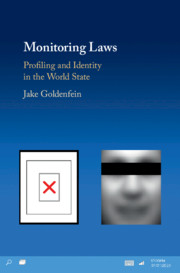Book contents
- Monitoring Laws
- Monitoring Laws
- Copyright page
- Contents
- Acknowledgements
- 1 Monitoring Laws
- 2 The Image and Institutional Identity
- 3 Images and Biometrics – Privacy and Stigmatisation
- 4 Dossiers, Behavioural Data, and Secret Speculation
- 5 Data Subject Rights and the Importance of Access
- 6 Automation, Actuarial Identity, and Law Enforcement Informatics
- 7 Algorithmic Accountability and the Statistical Legal Subject
- 8 From Photographic Image to Computer Vision
- 9 Person, Place, and Contest in the World State
- 10 Law and Legal Automation in the World State
- Index
2 - The Image and Institutional Identity
Published online by Cambridge University Press: 08 November 2019
- Monitoring Laws
- Monitoring Laws
- Copyright page
- Contents
- Acknowledgements
- 1 Monitoring Laws
- 2 The Image and Institutional Identity
- 3 Images and Biometrics – Privacy and Stigmatisation
- 4 Dossiers, Behavioural Data, and Secret Speculation
- 5 Data Subject Rights and the Importance of Access
- 6 Automation, Actuarial Identity, and Law Enforcement Informatics
- 7 Algorithmic Accountability and the Statistical Legal Subject
- 8 From Photographic Image to Computer Vision
- 9 Person, Place, and Contest in the World State
- 10 Law and Legal Automation in the World State
- Index
Summary
Our modern understanding of institutional identity began with police photography, and the building of Habitual Criminal Registers. These databases participated in building the social ‘archive’, were deployed to prevent recidivism, and developed in the context of evolving interest statistical knowledge systems, as well as biological fatalism in criminology and anthropology. The ‘mechanical objectivity’ of the camera, social, political, and intellectual influences, meant images and the archive were a new way of ‘knowing’ people, especially criminals, deviants, and other undesirables. Shortly after the institutional adoption of photographic registers, other technologies too were needed to make those registers searchable. This provoked the first anthropometrics and biometrics systems, and the first exercises in reducing identity to numerical data.
Keywords
- Type
- Chapter
- Information
- Monitoring LawsProfiling and Identity in the World State, pp. 21 - 41Publisher: Cambridge University PressPrint publication year: 2019

